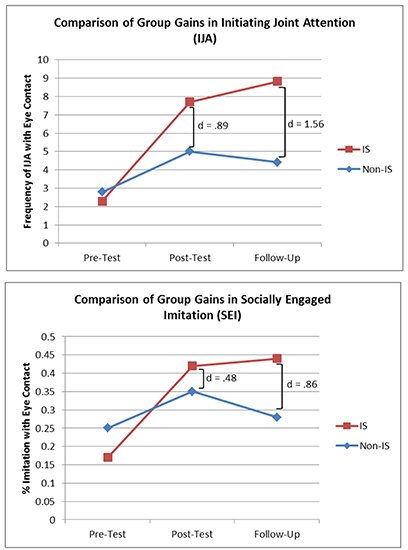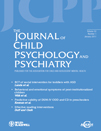Dr. Rebecca Landa’s early intervention research has shown that, when delivered in a center-based program for 10 hours per week for six months, the Early Achievements intervention is associated with significant social, cognitive, and language gains in young children with ASD (Landa, Holman, O’Neill & Stuart, 2011).
The pace of children’s learning was significantly accelerated during the Early Achievements intervention period.

Children maintained these gains during a six-month follow-up period when they were not receiving the Early Achievements intervention. Furthermore, the gains made during the intervention period were generalized to settings outside the classroom. This indicates that, even in core ASD deficit areas of social and language functioning, children with ASD learn when exposed to the Early Achievements intervention. When the children were assessed at school-age, their cognitive and communication skills had continued to improve. However, when not receiving the Early Achievements intervention, the children’s autism severity did not improve (Landa & Kalb, 2012).
Now, Dr. Landa is evaluating the efficacy of a recently adapted version of the Early Achievements intervention (EA) as implemented by community-based teachers with preschoolers with ASD. These children are in inclusive and non-inclusive classrooms in public intervention settings. She is examining whether EA-trained teachers demonstrate use of the EA instructional strategies more often and effectively than teachers not trained in the EA intervention. Also, she is examining the rate and amount of social and communication learning in students whose teachers are trained to deliver the EA intervention compared to those whose teachers are not. This study is funded by the federal Institute of Educational Sciences.

In addition, Dr. Landa has adapted the EA intervention for use by child care providers who have at least one child with a developmental delay, including those with ASD, in their classroom. The efficacy of this adapted EA intervention is being examined in urban mid-Atlantic child care centers. A randomized controlled trial design is being used, where child care providers are randomly assigned (as in flipping a coin) to be trained to use the EA instructional methods or not to receive this training. We are examining the effects of the intervention training and coaching on child care providers’ instruction, and whether there are differences in rate and amount of learning in children with developmental delays whose child care providers were and were not trained in the EA instructional methods. This study is being funded by the Maternal and Child Health Bureau’s Health Resources and Services Administration.
